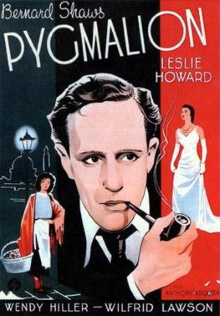Everyone knows about My Fair Lady but before that was this much earlier adaptation of George Bernard Shaw’s Pygmalion and the dramatist himself supervised this production and wrote the screenplay. Though it has been outshone by the musical now, this film was very successful in its day. Without the music, this is less fun but I feel that it does make the drama of the situation feel more serious and highlights the inherent unfairness of how much the way one speaks can alter a person’s fate.
One rainy evening in London, bystanders note a suspicious-looking character who seems to be jotting down what people are saying. When confronted, he turns out to be Professor Higgins who is collecting information about their dialects. Coincidentally also present is Colonel Pickering, another language enthusiast, and a passing comment by Higgins leads the two to take on a novel project: teaching the lowly flower girl Eliza Doolittle to speak properly so that she can pass as a duchess. Doolittle agrees as she wants a better life than just being a flower girl and all three move into Higgins’ home where the two men train her to speak and behave properly. Slowly but steadily, Doolittle makes progress and Higgins has her make her debut as a lady at a small gathering at his own mother’s house. While Doolittle’s pronunciation is perfect, Higgins has done little to educate her in the content of what she says and thus she scandalizes everyone present.
This is the same familiar story that everyone already knows, without the music and somewhat abbreviated as this is a significantly shorter film than My Fair Lady. It’s unavoidable that this is less entertaining and charming as a result. I remember that Audrey Hepburn plays Eliza Doolittle with such an exaggerated accent that she is barely comprehensible. Wendy Hiller’s accent here is audibly different from that of the others but it’s certainly a reasonable form of spoken English by modern standards. In fact, when Higgins lists out the different accents of the people around him, I think most people will have a tough time even noticing a difference. I think Doolittle’s mistake in this film is more interesting than My Fair Lady where her command of the language lapses as she grows excited at the horse race. Here, she maintains the accent throughout except that her vocabulary is unchanged which confuses the upper class gentlefolk and Higgins tries to pass it off as newfangled slang. It’s certainly funny in a different way.
Where this version stands out most I think is that the musical is so light-hearted in tone that it masks some of the darkness that is at the heart of this story. After Doolittle learns to speak properly, it’s not just that she feels out of place in Higgins’ home, she also realizes that she has lost her original identity. We can feel the tremendous and arbitrary injustice that an accent alone can determine one’s lot in life. This version retains the title of the original play and includes a card explaining a bit of the myth it comes from. It’s clear that Shaw meant for the theme to be about the professor molding a perfected woman who then goes on to emancipate herself from him. I think this version does that a little better as well.
Overall there probably isn’t too much reason to watch this and likely not many do. But it is closer to Shaw’s original vision of the drama and that alone might be of some interest to historians.
